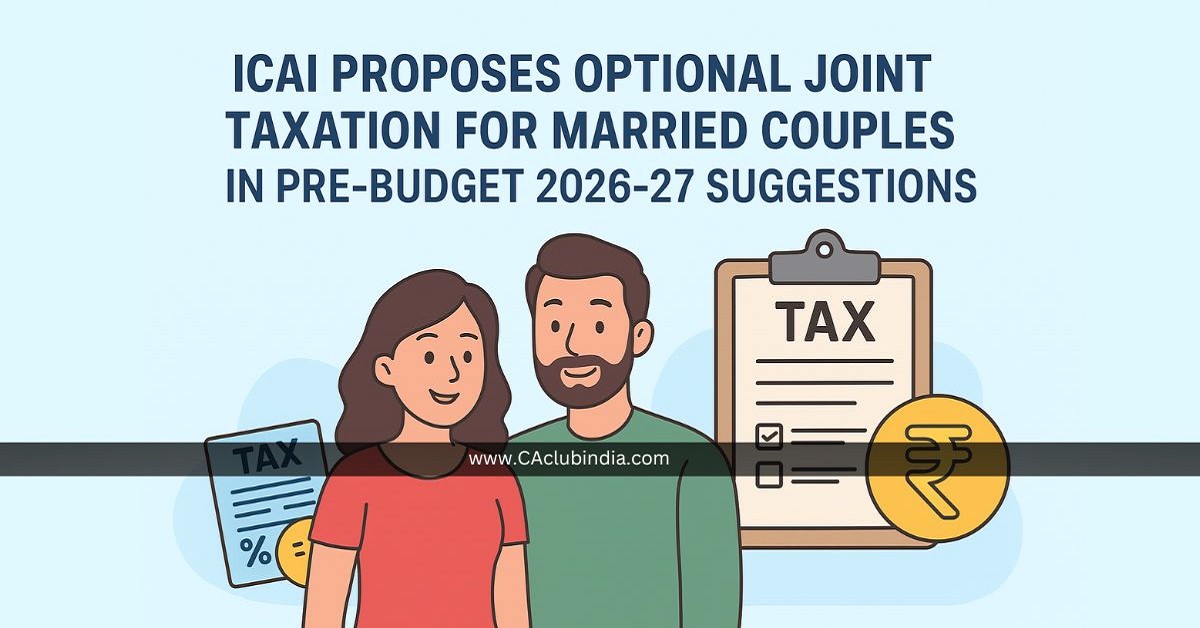In its Pre-Budget Memorandum for Union Budget 2026-27, the Institute of Chartered Accountants of India (ICAI) has proposed a series of prudent tax reforms aimed at simplifying compliance, promoting equitable taxation and encouraging sustainable economic growth. Among its key recommendations, the ICAI has suggested the introduction of optional joint taxation for married couples, a move that could significantly benefit dual-income households and align India's tax structure with global best practices.

Optional Joint Taxation for Married Couples: A Step Towards Fairness and Family Welfare
At present, India follows an individual-based taxation system where each spouse is taxed separately, even if both contribute to household income and expenses. ICAI's proposal for optional joint taxation seeks to give couples the flexibility to file returns jointly, allowing them to optimise tax liability and promote family financial planning.
Experts believe this measure could particularly benefit middle-class families where both partners are earning members, helping balance tax burdens and incentivising income disclosure. By aligning India's system with practices followed in countries such as the US, UK and Canada, this move could also simplify compliance for families and enhance taxpayer convenience.
Broader Tax Reform Agenda
Beyond this landmark proposal, ICAI's Pre-Budget Suggestions on Direct Taxes and International Taxation encompass a comprehensive framework to strengthen India's tax ecosystem. The recommendations focus on four core areas: mitigating litigation, reducing compliance burden, preventing tax avoidance and rationalising income-tax provisions.
Key highlights include
Mitigating Litigation
- Decriminalisation of select prosecution provisions
- Removal of dual penalties for the same default
- Restriction of return processing to arithmetical errors and prima facie incorrect claims
- Clarification that retrospective application of treaty notifications should not lead to unintended tax consequences
Reducing Compliance Burden
- Introduction of a year-wise e-ledger system for crediting TDS/TCS and advance tax payments
- Deduction of tax only on income chargeable to tax (based on CA certification) for payments to non-residents
- Exemption from TAN requirement for transferees paying non-residents
- Removal of TCS on sale of scrap
Preventing Tax Avoidance & Improving Tax Collection
- Exclusion of F&O and speculative business from the scope of presumptive income
- Audit requirement for all profit-linked deduction provisions
- Mandatory return filing by persons owning more than the specified acres of agricultural land
Rationalisation of Income-Tax Provisions
- Increase in surcharge thresholds and inclusion of medical insurance and dependent disability deductions under the default tax regime
- Clarification on surcharge rate for computing Maximum Marginal Rate (MMR)
- Streamlined auto-renewal for small trusts and a defined time limit for advance ruling decisions
ICAI's Vision for a Green and Resilient Economy
The ICAI has also urged the government to extend tax-neutral status to business reorganisations in LLPs, rationalise TDS on partner remuneration, and introduce incentives for green and sustainable projects-reinforcing its commitment to a cleaner and more inclusive economy.
ICAI's Legacy of Constructive Engagement
Highlighting the institute's continued collaboration with policymakers, CA Charanjot Singh Nanda, President of ICAI, said:
"ICAI has always been at the forefront of nation-building and continues to work closely with the Government as its trusted knowledge partner. Through our Pre-Budget Suggestions for 2026-27, we aim to support a tax ecosystem that promotes ease of doing business, drives sustainable growth and strengthens India's journey towards a resilient and green economy."
Notably, several ICAI recommendations from its earlier submissions, including its Comprehensive Review of the Income tax Act, 1961 and Memorandum on the Income-tax Bill, 2025 have already been adopted, shaping the Income tax Act, 2025, set to come into force from April 1, 2026.







 CAclubindia
CAclubindia

